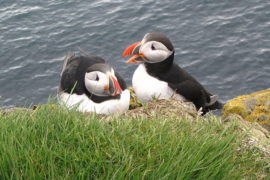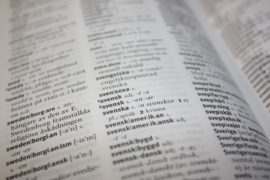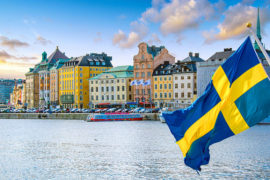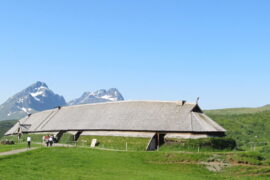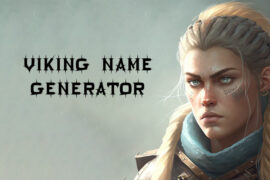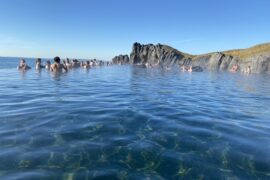Icelandic surnames are unusual in that many of them end in the suffix -son or -dottir. But why is this? And how do Icelandic last names work?
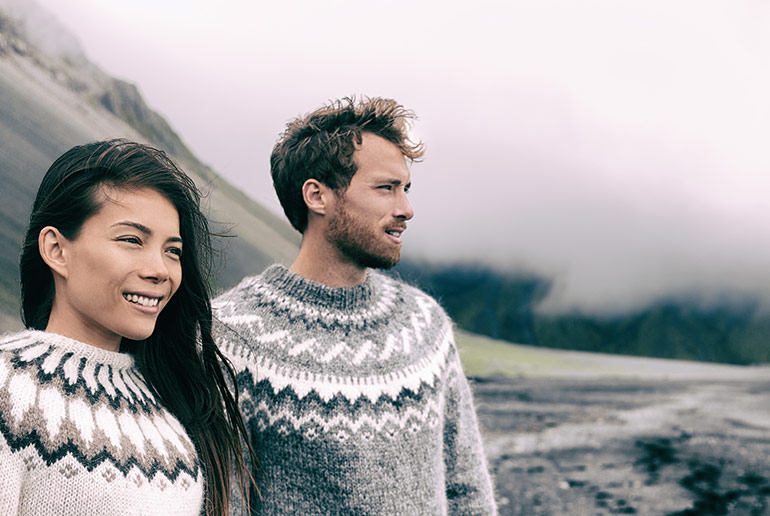
Why do Icelandic last names end in -son?
Like many other cultures’ naming systems, the Icelandic naming system is essentially patronymic in origin.
That means a son is usually given his father’s first name, with the suffix -son added to it.
A newborn baby, for example, may be given the first name Oluf by his parents, and if his father’s first name is Jón, the baby will have the surname Jónsson. So his full name will be Oluf Jónsson.
When Oluf Jónsson grows up and has children of his own, his son will have the last name Olufsson.
Why do some Icelandic last names end in -dottir?
For girls, the system works in exactly the same way, though they are given the suffix -dottir.
They still usually take the father’s first name, so Johanna, for example, who is the daughter of Jón, would be called Johanna Jónsdóttir.
If you want to find out how to pronounce -son and -dottir in an authentic Icelandic way, check out this clip below.
Do Icelandic children have to take their father’s name?
There are cases, of course, when it the mother’s name that is handed down to both daughters and sons.
In the past, this was usually when the parents were no longer together or there was a problem with the father.
Today, of course, it’s perfectly acceptable to follow the matrilineal line and for children to take their mother’s name.
So if Johanna and Oluf’s mother was called Anna, the parents – or the children themselves once they are older – could chose the names Johanna Annasdottir and Oluf Annasson.
The former professional football player Heiðar Helguson is probably the best-known example of someone who has adopted his mother’s name (Helga) for his surname rather than his father’s.
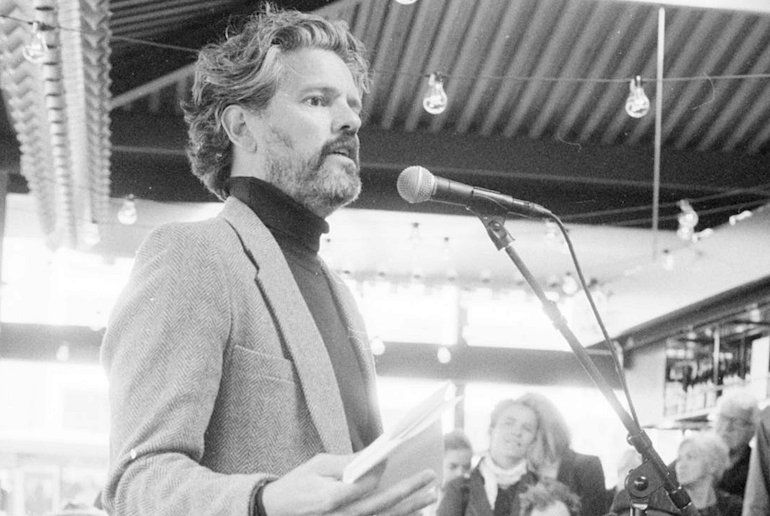
And some people nowadays are choosing to pass both parents’ names onto their children, such as the current mayor of Rejkyavik, Dagur Bergþóruson Eggertsson, who is the son of Bergþóra and Eggert.
So do Icelanders have last names?
This isn’t as silly as a question as it may seem, since Icelanders don’t actually have family names, although they do have surnames.
In many cultures, you can tell from someone’s surname who their grandparents are and whether they come from the same family as uncles, nephews or distant ancestors.
In Iceland all the last name will tell you is what their father’s (or in some cases their mother’s) first name was.
In the past when Iceland’s population was so small this was not a problem, since everyone knew everyone else’s family history and who was related to who anyway!
It is still very common today, however, to give children their grandparent’s first name in a nod to the family lineage.
Do married Icelandic women take their husband’s name?
What happens to Icelandic last names during marriage? Well, the names don’t normally change – and women keep the same name that they were born with.
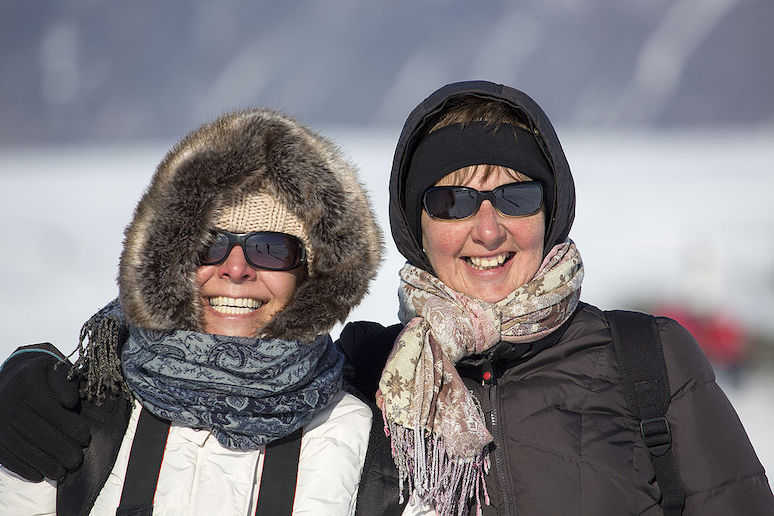
This may seem very feminist and right-on, but you should remember that in most cases the last name that most women have is actually that of their father – so, still patrilineal!
What is the Icelandic Naming Committee?
All newborn names in Iceland must be chosen from an approved list of around 1800 male and 1800 female names and registered within six months. (You can see the full list of approved names here, along with a whole host of names that have been rejected).
If parents want to chose a name not on the list they can apply to the Icelandic Naming Committee, who can reject any names not deemed Icelandic enough!
If the committee rejects your given name, you are simply registered as stulka, which means “girl” or strákur, which means “boy” on your passport and official papers.

In addition, until fairly recently, all except a very few approved names were divided into gender, so girls couldn’t be given names that were on the male list and vice versa.
This ruling was challenged by the parents of Blaer Bjarkardottir, who gave their daughter the name Blaer (which means “light breeze”) without realising that it was on the list of prescribed male names.
They sued the Icelandic government in 2013 and gained permission for Blaer to officially keep her name.
Are Icelandic names gendered?
Clearly having your surname depend on whether you are male or female is problematic for the transgender and non-binary community.
And only being allowed to chose from a list of boys’ or girls’ names compounded the problem.
So, in 2019 the Gender Autonomy Act was passed in the Icelandic parliament allowing both boys and girls to be given any name on the official list regardless of gender.
It also legitimised use of a gender neutral suffix -bur, that transgender and non-binary people can use instead of -son and -dottir.
However only those who have officially registered as gender neutral are allowed to use the suffix -bur, which means “offspring” or “child”.
Common Icelandic surnames
When we look at Icelandic last names and their meanings, we can see that it’s pretty simple to work out what they mean because the vast majority of Icelandic surnames share one of two suffixes.
So all those surnames ending in -son mean “the son of …” and all those ending in -dottir mean “the daughter of …”
Some of the best known Icelanders are the TV presenter Magnus Magnusson, whose name is Magnus, the son of Magnus, and the singer songwriter Bjork Guðmundsdóttir, whose last name means “the daughter of Guðmundur”.
Unsurprisingly, the two most common Iceland surnames are Jónsson and Jónsdóttir, but do you know any of the rest? Read on to find out the top twenty most common Icelandic surnames in order of their popularity.
- Jónsdóttir
- Jónsson
- Sigurðardóttir
- Guðmundsdóttir
- Guðmundsson
- Sigurðsson
- Gunnarsdóttir
- Gunnarsson
- Ólafsson
- Ólafsdóttir
- Magnúsdóttir
- Magnússon
- Einarsson
- Einarsdóttir
- Kristjánsdóttir
- Kristjánsson
- Björnsdóttir
- Stefánsson
- Jóhannsson
- Jóhannsdóttir
See also:
Cool Viking names and their meanings
Cool Icelandic names for girls
Norse names and their meanings
Icelandic boy names

